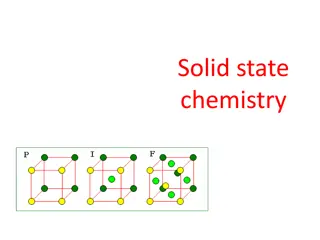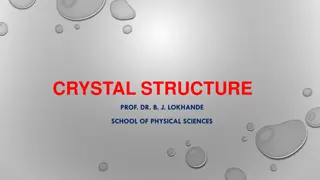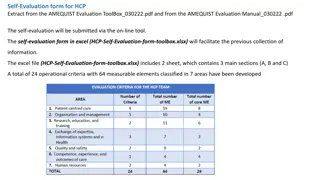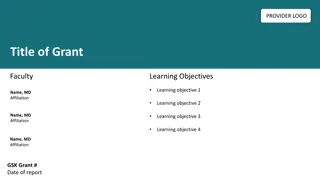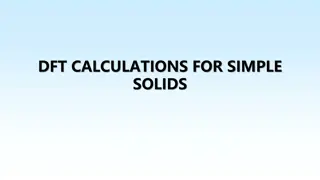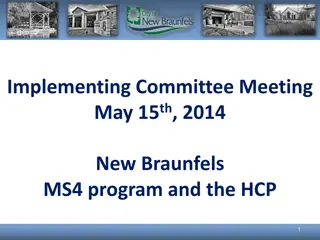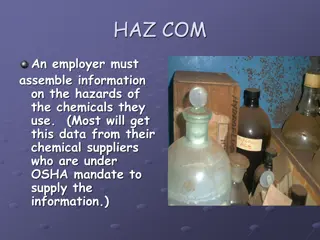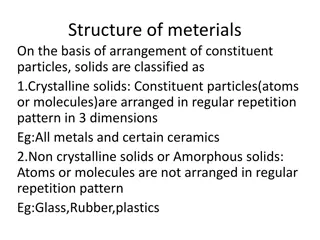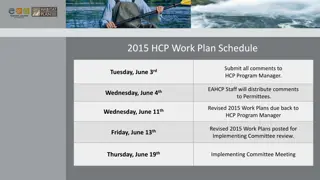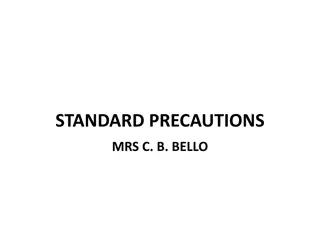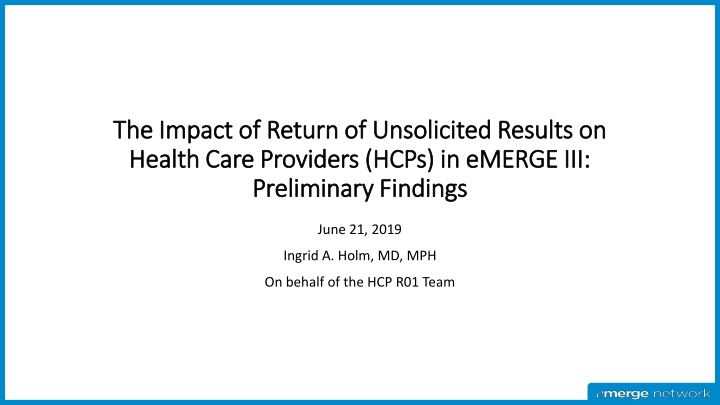
Unsolicited Genomic Results Impact on Healthcare Providers in eMERGE III Study
Explore the preliminary findings of the impact of returning unsolicited genomic results to healthcare providers (HCPs) in the eEMERGE III study led by Dr. Ingrid A. Holm. Investigate HCPs' perceptions, actions, and barriers regarding incorporating genomic sequencing results into clinical care, aiming to identify approaches to improve interactions with patients and health service utilization.
Download Presentation

Please find below an Image/Link to download the presentation.
The content on the website is provided AS IS for your information and personal use only. It may not be sold, licensed, or shared on other websites without obtaining consent from the author. If you encounter any issues during the download, it is possible that the publisher has removed the file from their server.
You are allowed to download the files provided on this website for personal or commercial use, subject to the condition that they are used lawfully. All files are the property of their respective owners.
The content on the website is provided AS IS for your information and personal use only. It may not be sold, licensed, or shared on other websites without obtaining consent from the author.
E N D
Presentation Transcript
The Impact of Return of Unsolicited Results on The Impact of Return of Unsolicited Results on Health Care Providers (HCPs) in eMERGE III: Health Care Providers (HCPs) in eMERGE III: Preliminary Findings Preliminary Findings June 21, 2019 Ingrid A. Holm, MD, MPH On behalf of the HCP R01 Team
HCP Core group Ingrid Holm BCH Jill Madden BCH Melanie Myers CCHMC Janet Williams Geisinger Kathy Leppig KP/UW Georgia Wiesner Vanderbilt Ellen Clayton Vanderbilt Kyle Brothers Louisville Sonja Ziniel Survey methodologist NHGRI NHGRI R01 R01 Subcontracts to 9 clinical sites
Little is known concerning the views, concerns, and challenges for HCP regarding the desirability, utility, actionability, and meaning of incorporating results of genome sequencing (targeted sequencing of disease gene panels, WES, WGS) into clinical care Background Background HCP surveys were not part of the plan at most sites
The eMERGE III Network is one of the first in which unsolicited genomic results will be returned to HCPs on a large scale. We will leverage this unique opportunity to study the impact of genomic results disclosure in a real world setting, including the HCPs perceptions of their role and responsibilities, their actions and barriers to actions. Significance Significance
Aims Aims 1. Survey participant s HCPs (primary care +/- subspecialists) one month after receiving an unsolicited positive GS result. 2. Conduct in-depth qualitative interviews at four representative eMERGE sites: Within 6 months after a HCP receives a positive result, assess 1) actions taken in response to the result and 2) ELSI of receiving the result on HCPs. In HCPs at sites where negative results are reported, assess whether HCPs took any actions in response to this information. 3. Identify approaches to returning unsolicited GS results that overcome barriers to HCPs acting on genomic results, and that facilitate interactions between HCPs and patients in the return and follow-up of the results. HCP data will be integrated with data collected by the Outcomes Workgroup and the Participant Survey Subgroup correlating the HCP self-reported data with impact on health service utilization, medical outcomes, and participant self-reported data.
Survey Domains Demographics, medical practice, training, genetic knowledge Impact of genetic information Mechanics of disclosure to patient Mechanism of disclosure to HCP HCP knowledge gaps Information and education needs of HCPs Responsibility for care when HCP did not order the test Impact on the HCP-patient interaction Burden on clinical practice Insurance issues Liability Long term obligations
Emails invitations sent Email surveys completed Email response rate 306 115 38% Enrollment to Enrollment to date date Mailed invitations sent Mailed surveys completed Mail response rate 136 11 8% Total invitations sent Total surveys completed Total response rate 442 126 29%
Demographics Demographics Age 21 30 years 31 40 years 41 50 years 51 60 years 61 70 years >71 years 7.9%Specialty 23.6% 29.9% 26.8% 8.7% 3.2% General IM IM Subspecialty General Peds Peds Subspecialty Family practice General Med/Peds Med/Peds Subspec General Surgery 35.9%Yrs practice 11.3% 10.4% 2.8% 31.1% 3.8% 0.9% 1.9%Patient ages 0-5 years 6 10 years 11 15 years 16 20 years 21 25 years >25 years 15.6% 18.0% 10.2% 14.8% 18.8% 22.7% Gender Female 55.5% Pediatric based Adult based Both peds and adult 14.8% 50.8% 34.4% Ethnicity Latino/Hispanic 3.1%Subspecialty Cardiology 33.3% 16.7% 8.3%Setting 16.7% 8.3% 16.7% Genetic training No Endocrinology Gastroenterology Oncology Pulmonology Other Race White 80.0% Hospital, HMO Academic medical Private practice 40.9% 44.9% 14.2% Role Physician NP PA 78.5% 8.2% 6.7% 75.6%
Gene LDLR LMNA MLH1 MSH2 MSH6 MYBPC3 MYH7 NF2 PALB2 PKP2 PMS2 POLD1 RET SCN5A SCN5A R1626H SDHAF2 SDHB SDHC SDHD SERPINA1 TNNT2 TP53 Trisomy 12 Frequency 10 1 2 2 2 4 2 1 2 1 2 1 4 2 1 1 1 2 1 6 1 1 1 Gene APC APC I1307K APOB ATM BRCA1 BRCA2 CACNA1A CFTR CHEK2 CHEK2 S428F CHEK2 and SERPINA1 CHEK2, S428F DSG2 DSP DSP Y42* F5 FBN1 HFE HFE Homo KCNE1 KCNE2, Met54Thr, risk variant KCNH2 KCNQ1 Frequency 5 3 3 5 10 11 1 3 7 1 1 1 3 3 1 1 1 18 2 1 1 1 2 Gene Gene findings to findings to HCPs who HCPs who completed completed the surveys the surveys
Initial reactions to receiving the unsolicited genomic result for this patient Strongly disagree 11.1% 50.0% 12.8% 40.6% Somewhat disagree 8.6% 20.8% 20.5% 20.3% Somewhat agree 46.9% 15.3% 42.3% 30.4% Strongly agree 33.3% 13.9% 24.4% 8.7% Positive Negative Surprised Ambivalent To what extent do you agree with the following statements about receiving this result? Strongly disagree The result was informative 10.7% The result was confusing 38.8% The result was helpful 9.8% The result was useless 56.0% Somewhat disagree 11.9% 26.2% 18.3% 26.7% Somewhat agree 41.7% 5.0% 26.8% 5.3% Strongly agree 35.7% 30.0% 45.1% 12.0%
Genetic knowledge Genetic knowledge Not at all confident 11.3% 12.7% A little confident 39.1% 34.3% Somewhat confident 41.4% 41.0% Very confident 8.3% 11.9% How confident are you in your knowledge about genetics? in your ability to explain genetic concepts to patients? in your ability to respond to patients questions about genomic sequencing technologies? 38.8% 38.8% 16.4% 6.0% in your ability to explain a result from a genetic test to patients? that your training has prepared you to explain a genomic result to a patient? 18.1% 39.9% 33.1% 9.0% 34.1% 37.2% 22.5% 6.2%
Before consulting resources other than those Before consulting resources other than those provided with the result, when you received the provided with the result, when you received the unsolicited genomic result, how confident did unsolicited genomic result, how confident did you feel in your . you feel in your . Not at All Confident A Little Confident Somewhat Confident Very Confident knowledge about the condition caused by this gene? ability to explain the result to your patient? ability to answer your patient s questions about the result? ability to personally manage the patient s care based on the result? 22.4% 31.8% 29.4% 16.5% 29.1% 26.7% 26.7% 17.4% 31.4% 31.4% 25.6% 11.6% 29.4% 30.6% 27.1% 12.9%
Which of the following actions did you perform to Which of the following actions did you perform to gather any additional information after receiving the gather any additional information after receiving the unsolicited genomic result? unsolicited genomic result? Yes No Not sure Learned more information about the condition Learned more information about this specific variant Reviewed the patient's personal medical history for symptoms of the condition Reviewed the patient's family history for this condition 55.9% 40.5% 3.6% 45.2% 50.0% 4.8% 75.0% 23.8% 1.2% 70.2% 26.2% 3.6%
How similar or different was receiving this unsolicited How similar or different was receiving this unsolicited genomic result for this patient compared to receiving genomic result for this patient compared to receiving other unsolicited results, such as a CBC ordered by other unsolicited results, such as a CBC ordered by another physician? another physician? Very different Somewhat different Somewhat similar Very similar 40.7% 42.0% 9.9% 7.4%
72.9% had discussed the result with their patient 62.9% contacted the patient to discuss the result Of those who did not 39.1% plan to speak to patient 52.2% defer speaking to patient to allow another provider whom the patient sees to contact patient Discussions Discussions with with patient patient
Topics discussed Topics discussed No Yes Don t recall 20.3% 6.9% Gene name The condition (e.g. natural history, prognosis, risk implications, management, etc.) Insurance concerns (medical, disability, and/or life) Sharing the result with family members 27.1% 5.2% 52.5% 87.9% 68.8% 22.9% 11.5% 65.6% 19.7% 11.5% How much time did you spend discussing 77.0% 15 minutes
Did you refer your patient to a subspecialist/s? 55.7% Yes Which subspecialists did you refer your/the patient to? 41.2% Genetics 14.7% Cardiology 11.8% Oncology 32.3% Other Did you order additional test/s on your/the patient? 19.7% Yes Which of the following additional tests did you order on the patient? 75.0% Blood work or urine test 25.0% Colonoscopy 8.3% X-rays 8.3% ECG/EKG 8.3% MRI/CT scan 8.3% Mammogram Did you recommend family members undergo testing? 42.6% Yes Actions Actions taken taken
Implications for patients current care Implications for patient s current care Strongly disagree 8.3% Somewhat disagree 7.1% Somewhat agree 32.1% Strongly agree 46.4% The unsolicited genomic result is important to this patient's healthcare The unsolicited genomic result might lead to patient harm through unnecessary follow-up Responding to the unsolicited genomic result was a burden to me 33.3% 34.5% 21.4% 3.6% 32.1% 23.8% 33.3% 7.1% In what ways did you find the unsolicited genomic result useful? 51.1% Planned future disease surveillance or screening 32.2% Identified at-risk family members 25.6% Informed disease prevention 21.1%Supported the management of patient s care already underway 16.7%Changed current management of patient s care 14.4% I did not find the unsolicited genomic result useful
What type of information would you have liked to receive with result? 71.1% Explanation of the result 67.8% Recommendation(s) for patient management 61.1% Information on long-term implications of the result on the patient Information Information to receive to receive with result with result 58.9% Recommendation(s) for patient referral 56.7% Contact information for referral to genetic counselors and/or medical geneticist How would you liked to receive this additional information? 66.7% Through the EHR 25.6% A letter with the result or after the result was received 12.2% By email 2.2% By phone
Thinking about the future Thinking about the future Increase greatly Increase somewhat No effect Decrease somewhat Decrease greatly Don t know What effect do you believe receiving unsolicited genomic results will have on your workload? on the difficulties getting reimbursed for medical care related to managing the results? 19.5% 15.8% 57.8% 29.9% 17.2% 1.6% 25.2% 0.8% 0.0% 0.8% 3.9% 27.6% Strongly Disagree 8.6% Somewhat Disagree 10.9% Somewhat Agree 48.4% Strongly Agree 32.0% I would like to receive unsolicited genomic results ...that could affect the patient s health in the future even if there is no medical intervention. indicating that a patient is NOT at risk for developing a condition (a.k.a. negative results). even if there is an unclear association between the genetic finding and disease. 7.0% 14.1% 42.2% 36.7% 25.8% 25.0% 32.0% 17.2%
Comments from HCPs Comments from HCPs
Receiving unsolicited results Receiving unsolicited results I want ownership of the result by the investigators who ordered it. There should be autonomic consult already in the computer and placed so that the unknowing physician is not burdened with dealing with something that is out of their knowledge base or expertise. (Patient: male, 67 years old, BRCA2, hereditary breast ovarian cancer syndrome (HBOC)condition type; Provider: Not main provider)
I am excited about the idea of introducing genetic testing for patients when there is a clear and actionable response to testing. However, I have always been weary about ordering testing for patients ('unsolicited' to use your terminology) when the ordering provider is not responsible for following up the testing themselves. I think the accountability must be there. If testing is performed and a primary is responsible for reviewing with the family who never ordered the test I think that would make many of us uncomfortable. As an example, Genesight testing is not uncommon at our practice. For most patients it is not the clear response families are hoping for, they often pay out of pocket (possibly hundreds of dollars), and it may or may not affect treatment, not to mention the cost overall to the healthcare system. I think testing can be very helpful, but providers should be responsible for explaining to a patient why a test should or should not be performed, the benefits, the potential costs, and what we would do with it. Patients overall love testing as I see it, but when they realize it is costly, often low yield, and may or likely won't change management they tend to realize its not always worth it. Thanks for your time! (Patient: male, 15 years old, LDLR, familial hypercholesterolemia condition type; Provider: PCP)
The genetics staff needs to make more effort to contact patients in a way that is convenient to patients. I had one patient complaint quite a bit about how he was contacted (messages left to call genetics right away and when he did, no one was there). Genetics staff should take the lead in explaining the result and refer back to the PCP once this conversation has occurred with recommendations for the PCP about next steps, just like any other consultant would do. Genetics is a broad field. a PCP might know a lot about one disorder but not much about another, depending on how rare one might be. It would be best if the genetics team where more clinically oriented and act as clinical consultants like any other specialty. (Patient: male, 68 years old, HFE, hemochromatosis condition type; Provider: PCP)
Relevancy of unsolicited results Relevancy of unsolicited results I received a genetic result on a 76 yo patient. The likelihood that he would develop an inherited disease at the age of 76 is vanishingly small. Nonetheless, after discussion, we pursued further work up. An incidental finding will require further follow up. I find this aggravating in that the result is of no practical use and yet creates more work for me and more interventions for the patient. (Patient: male, 76 years old, SDHC, hereditary paraganglioma/pheochromocytoma syndrome condition type; Provider: Not main provider) information on how their mental health was considered prior to enrollment in study. Was this really the best time in her life to get this information (Patient: female, 14 years old, BRCA1, hereditary breast and ovarian cancer syndrome condition type; Provider: Not main provider)
The result was absolutely useless for this patient. She is an 85 year old frail individual with dementia and multiple medical problems, She would have no understanding of this condition and did not benefit at all from finding this out. She has lived 85 years without any evidence of any problems related to having this genetic variant. Finding it out now was beyond ridiculous. I did call her daughter. her daughter took it well and she ahs a medical background so the discussion was very easy, fortunately. I discussed that she and her sister may want to discuss this further. the patient has at least two grandchildren that I am aware of that are young. I discussed with her daughter about perhaps discussing further with their pediatricians. The daughter does think that she and her two children have been enrolled in mycode. I am actually not sure how this patient got enrolled. I do not think she is capable of giving informed consent herself. Daughter may have agreed to it but in our conversation she does not recall. (Patient: female, 85 years old, TP53, Li-Fraumeni syndrome condition type; Provider: PCP)
Benefits Benefits I can see that there may be long term benefits to genetic testing but we are not there yet. Right now the work is greater than the benefit to the patient (Patient: female, 20 years old, HFE, hemochromatosis condition type; Provider: Not main provider)
Summary Summary HCPs are not particularly confident in their genetics knowledge and ability to communicate genetics results to their patients Initial reactions to receiving results were generally positive, HCPs generally found the results useful HCP perceive unsolicited genomic results as different than other unsolicited results Familial implications about 65% discussed familial implications and about recommended family testing Despite concerns about increased burden on their practice, most HCPs would like to receive results that could impact their patients care, as well as negative results.
Thank you! Thank you!

